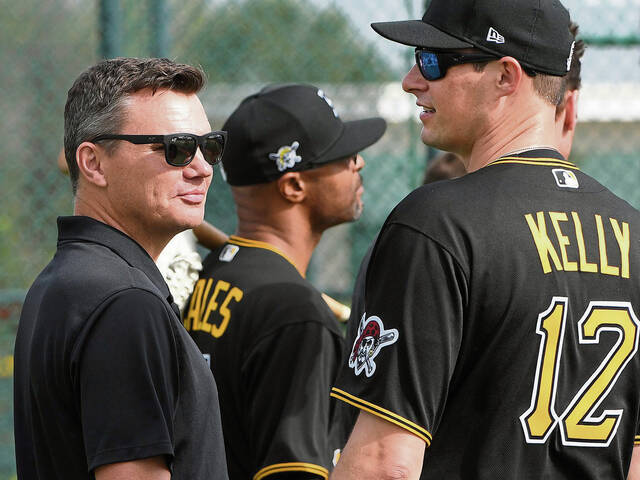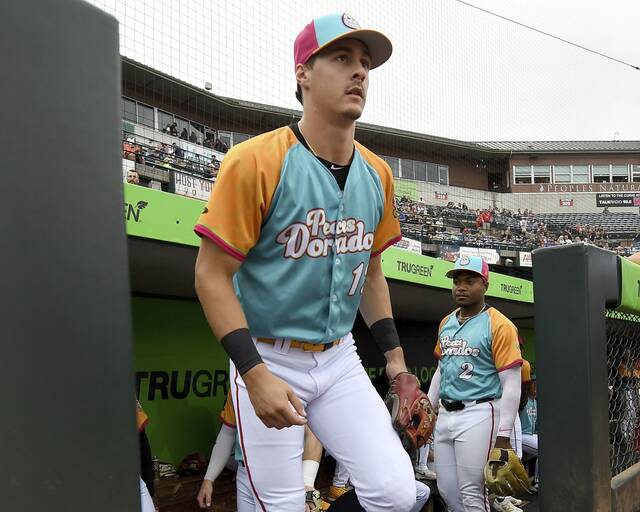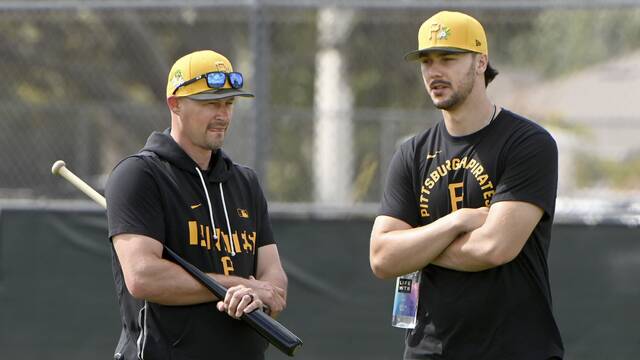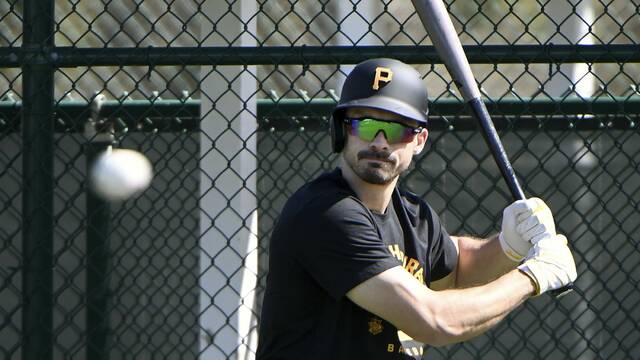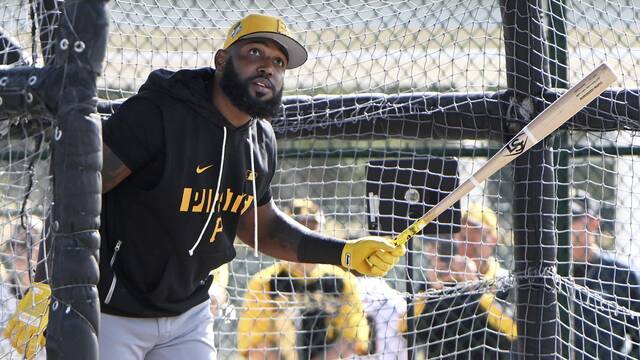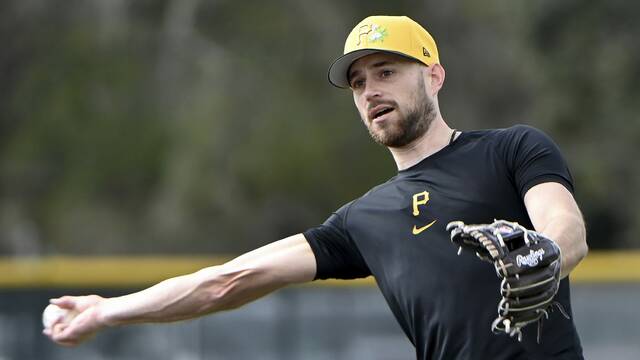The Pittsburgh Pirates started the season with a proclamation.
“It’s time to win,” Derek Shelton said in March. “That’s the only focus.”
They opened PNC Park with a mandate.
“We didn’t win enough,” Pirates chairman Bob Nutting told TribLive on April 4, before the home opener. “We need to win more.”
If the season started with a sense of urgency, it’s because the Pirates have Paul Skenes in their possession. The window to win with the best pitcher in baseball is open, and everyone knows that it’s going to close fast as he approaches arbitration and becomes unaffordable.
When the Pirates concluded their seventh consecutive losing season, they were still talking about winning. Even after losing 91 games, finishing in last place in the NL Central for the fifth time in six years under general manager Ben Cherington, the Pirates talk about how they believe they are close to becoming a playoff contender.
“I think it’s important for the organization to have one priority, and that’s the major league team on the field and winning as fast and as much as we can,” Cherington said. “That’s important for all kinds of reasons. It’s certainly our entire focus, my entire focus. I know how important it is.
“Paul is a part of that. Because of where Paul is in his career, he’s an important part of why it’s urgent. But it’s not just about Paul. It’s about the Pirates. We need to deliver better. It has to be the most important thing.”
1. Skenes scene: The 23-year-old right-hander is expected to be a runaway winner of the National League Cy Young Award, and some baseball analysts are predicting a unanimous vote.
Skenes won the Baseball Digest/Inside Edge MLB pitcher of the year award by a landslide, receiving 21 of 24 first-place votes. The only others receiving votes pitch in the American League: Detroit’s Tarik Skubal and Boston’s Garrett Crochet.
It’s easy to cite Skenes’ sub-2.00 ERA as evidence that he’s deserving, even if he joked that he was worse because his MLB-best 1.97 ERA was a tick higher than his rookie year (1.96).
What’s funny is that if there was a knock on Skenes last season, it was because he didn’t arrive in the majors until mid-May and pitched only 133 innings over 23 starts. His numbers are nearly identical over a full season, with his NL-leading WHIP (0.948) being only a thousandth of a point down from his rookie year despite pitching 187⅔ innings over 32 starts.
To understand how dominant Skenes was this season, go beyond the 20 quality starts and 216 strikeouts. Consider that he didn’t allow an earned run in 14 starts — and pitched at least five innings in each of those scoreless outings — and gave up one earned run in six starts and two earned runs in six others.
Yet the Pirates went 17-15 in his 32 starts, and Skenes finished with a 10-10 record.
“Obviously, for the guy, the way he works, the way he competes, the stuff he’s got, the way he goes about it, we all want that for him,” Pirates manager Don Kelly said. “Hopefully, it’s this year. Whether it’s this year or not, he’s a Cy Young-worthy pitcher. It would mean a lot to Paul, to the organization, for him to win that.
“Knowing Paul and the way he goes about things, the thing that is so impressive is that’s not why he does what he does. He does what he does because he wants to be really good. He wants to be great. And he wants to go out there and help the Pittsburgh Pirates win baseball games. As he continues to work at that, I think that those accolades and awards are going to be a by-product of who he is and how he goes about things and the talent that he’s been blessed with. He’s deserving of that award. Hopefully, it happens this year. But, knowing him and the way he goes about things, it’s going to be a consistent conversation.”
2. Freaky streaks: The Pirates could use a long conversation about consistency, especially after how streaky they were this season.
The worst of their streaks was record-tying, of course, as they tied a major league mark with 26 consecutive games of not scoring more than four runs from April 23-May 22.
But the Pirates’ losing streaks were even more troubling.
They lost 10 of 11 games between April 26 and May 7. Their longest losing streak was eight games, from July 4-12. But they lost 11 of 12 games in that stretch only to win eight of their next nine games, which became a consistent trademark.
In August, the Pirates lost eight of 10 between Aug. 9-19. Then they won eight of their next 10 and 11 of 14. They lost 12 of their next 13, then won six of their final eight games.
That type of up-and-down play takes a toll on a team.
“We’re not as far off as some might think. We’ve shown flashes of that,” Kelly said during the final homestand. “I think the consistency is a big thing. Being more consistent in the day-to-day type stuff, eliminating these longer losing streaks. Find a way to win. That’s the thing.”
3. One-run and done: One of the points Kelly made late in the season — before his contract was extended — was how the Pirates need to fare better in games where the outcome was decided by a run.
They went 25-35 in one-run games, losing eight by walk-off. There was a stretch from Sept. 9-14 where the Pirates lost five of six games by one run, including all three in a sweep at Baltimore and two of three at Washington.
The Pirates lost six of Skenes’ starts by one run. Even worse, they lost nine starts by Mitch Keller by one run. And they had five one-run wins for Skenes and Keller, failing to provide enough run support for either of their top two starters.
The Pirates also struggled in division play (19-33) and interleague play (17-31). They went 3-10 against both the Chicago Cubs and Milwaukee Brewers — who are facing each other in the NL Division Series — but went 7-6 against the St. Louis Cardinals and 6-7 against the Cincinnati Reds.
And more mind-boggling is that the Pirates swept the champions of the NL East (Philadelphia Phillies) and NL West (Los Angeles Dodgers) but were swept by last-place finishers in the 102-loss Chicago White Sox and Orioles.
What doomed the Pirates was the difference in their home-away records. Despite going 44-37 (.543 winning percentage) at PNC Park, they were 27-54 (.333) on the road.
Kelly was at a loss to explain the disparity, especially how the Pirates continued to lose close games on the road.
“I wish I knew, and I’ve been waiting for somebody to ask,” Kelly said last month. “It’s the elephant in the room. It’s something that’s mind-blowing when you look at it because we try to talk about things all the time: What is it? Why is it? What can we do different on the road? Is there something we do different at home than on the road? Do guys just feel better about being at PNC Park?”
4. Get Brewing: The solution to their struggles might come with developing — and, more importantly, embracing — an identity.
Kelly touched on that topic late in the season, emphasizing the need for the Pirates to be aggressive offensively but play smart.
Kelly wants a team-first approach, which he believes began after the All-Star break when they were swept at home by the White Sox by a combined score of 27-7 but answered by sweeping the Detroit Tigers in the next series.
“Being aggressive in the right situations without being afraid of fail,” Kelly said. “We need to understand the situation beforehand, understand the score or the inning, everything that goes into it, understand how the outfielders are and how they throw, then go play the game. It’s not always going to be perfect. We’re going to get thrown out. There’s going to be times when we try to steal and we get caught. But how do we do it in the right way, to be aggressive and put pressure on the defense to stop us, basically.”
Both Kelly and Pirates players have pointed to the NL Central champion Brewers as a team after which to pattern their play in every phase of the game.
“They compete really well,” Kelly said. “They battle at the plate. They’re tough outs, and they play really good defense, which makes it really tough. Their ability to foul pitches off and work counts and find a way to wear pitchers down, then they run. They’re aggressive on the bases, too.”
Bryan Reynolds likens the way the Brewers play small ball to college baseball. Given that he won a College World Series at Vanderbilt, Reynolds is willing to embrace it.
“I think that’s good baseball,” Reynolds said. “That’s kind of what the Brewers do … just doing all the little things right. Moving runners. Baserunning. I feel like at this level we shouldn’t have to ask somebody to do that. It should be wired in them. But it’s just something we’ve got to lean into.”
5. Future is now: The Pirates know their success begins with Skenes, but he’s not their only potential star.
Rookie right-hander Bubba Chandler showed signs of being dominant with 31 strikeouts against four walks, as the Pirates won six of his seven appearances, including three of four starts.
But the big attraction next season should be Konnor Griffin, who is considered the consensus top prospect in baseball and ended the season at Double-A Altoona.
The 6-foot-4, 225-pound shortstop is a five-tool talent who had a monster season in his first full year as a professional, batting .333/.415/.527 with 23 doubles, four triples, 21 home runs, 65 stolen bases, 94 RBIs and 117 runs scored across three levels in the minor leagues.
Cherington did his best to downplay talk that Griffin could start the season with the Pirates next year, showing concern that he’s still a teenager who doesn’t turn 20 until April 24 and has played only 21 games above Class A.
“I think we’ve got to be really careful about it, honestly,” Cherington said. “He’s had a remarkable season. He’s 19 years old. He’ll be 19 next April still, I believe. That means that — while he’s had a remarkable season, we’re obviously incredibly excited that he’s a Pirate — there’s still more to learn.
“He hasn’t played above Double-A. So I do think we do need to be careful with it. This is a player that’s really important to the Pirates. It’s important to him, too, that he’s set up to have the longest, best career possible for him. We have some influence on that in terms of how we guide the next months, years of his entry into the big leagues, however long that takes. So I do think we need to be careful about it.”
Yet Cherington did allow that Griffin is a different talent, one who could change their mind. Cherington is impressed with Griffin’s desire to keep getting better, up until the last day of his season.
“Sometimes there are unusual young players that don’t follow all the rules,” Cherington said. “We just don’t know yet where that’s going to take us. I think we’ll keep assessing that moving forward and we’ll keep learning from him. We don’t have to make any decisions right now about next year or future years.”
If the Pirates’ proclamations mean anything for the future, their only focus should be on the urgency to win more now.


